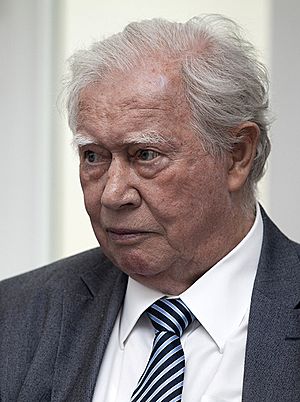Hans Mommsen facts for kids
Quick facts for kids
Hans Mommsen
|
|
|---|---|

Mommsen in 2013
|
|
| Born | 5 November 1930 |
| Died | 5 November 2015 (aged 85) Tutzing, Germany
|
| Nationality | German |
| Occupation | Historian |
| Known for | Studies in German social history |
Hans Mommsen (born November 5, 1930 – died November 5, 2015) was an important German historian. He was famous for studying the history of German society. He also had a special way of looking at Nazi Germany (also known as the Third Reich). He believed that Adolf Hitler was not a strong leader, but rather a "weak dictator" who reacted to events instead of planning everything.
Hans Mommsen came from a family of famous historians. His great-grandfather was Theodor Mommsen, who won a Nobel Prize. Hans Mommsen was also a member of the Social Democratic Party of Germany, a political party.
Contents
Life and Early Career
Hans Mommsen was born in Marburg, Germany. His father, Wilhelm Mommsen, was also a historian. Hans had a twin brother, Wolfgang Mommsen, who became a historian too.
Hans studied German, history, and philosophy at different universities in Germany, including the University of Heidelberg and the University of Marburg. He later became a professor, teaching history at universities like University of Tübingen and the University of Bochum. He joined the Social Democratic Party of Germany in 1960 and remained a member until he passed away on his 85th birthday in 2015.
Focus on German Workers
Much of Mommsen's early work looked at the history of the German working class. This means he studied the lives and experiences of ordinary people who worked in factories and other jobs. He explored how their lives changed and how they influenced German society. His book, Arbeiterbewegung und nationale Frage (The Labour Movement and the National Question), published in 1979, brought together many of his ideas on this topic.
Understanding Nazi Germany
Hans Mommsen was a leading expert on Nazi Germany and the terrible event known as the Holocaust. He had a specific way of understanding how the Holocaust happened, called "functionalism."
The "Weak Dictator" Idea
Mommsen believed that the Final Solution (the Nazi plan to kill all Jewish people) was not a long-term plan made by Adolf Hitler from the very beginning. Instead, he thought it happened because the German government became more and more extreme over time. He called this "cumulative radicalization."
Mommsen is most famous for saying that Hitler was a "weak dictator." This means that Hitler didn't always make clear decisions or have a strict plan. Instead, Mommsen thought Hitler often reacted to different groups and pressures within the Nazi government. Mommsen also believed that Nazi Germany was not a completely totalitarian state, where the government controls every part of people's lives.
Along with his friend Martin Broszat, Mommsen developed the idea that the Nazi state was actually quite messy. They saw it as a collection of different government departments and groups that were often fighting for power.
Different Views on Hitler
Not everyone agreed with Mommsen's ideas. Other historians, like Andreas Hillgruber and Klaus Hildebrand, believed that Hitler and his ideas (Nazi ideology) were much more important than Mommsen suggested. They argued that Hitler had a clear plan and was in control. Some critics also felt that Mommsen focused too much on what happened lower down in the government and not enough on the decisions made by Hitler and the top leaders in Berlin.
Other Historical Interests
Mommsen wrote important books and essays about why the Weimar Republic (the German government before the Nazis) failed. He often blamed German conservatives for its downfall.
Like his brother Wolfgang, Mommsen supported the "Sonderweg" (Special Path) idea. This idea suggests that the way German society, culture, and politics developed in the 1800s made it almost certain that Nazi Germany would rise in the 1900s.
Mommsen was also interested in people who resisted the Nazis in the Third Reich. He studied the challenges faced by those who opposed the Nazis, especially when they didn't have much support from the general public. He compared the resistance efforts of conservative groups with those of the Social Democrats and Communists.
Starting in the 1960s, Mommsen was part of a new group of historians. They looked more critically at the German resistance, especially among the elite. They argued against the idea that the resistance fighters of "July 20" (a famous plot to kill Hitler) were the main inspiration for Germany's new government after World War II.
Historian's Role
Hans Mommsen was a well-known figure in Germany. He often spoke out on important issues of his time. He believed that historians have a duty to help people understand the past so that mistakes are not repeated. He felt it was important for citizens to be aware of history and to question society around them.
See also
- List of Adolf Hitler books
 | William L. Dawson |
 | W. E. B. Du Bois |
 | Harry Belafonte |

